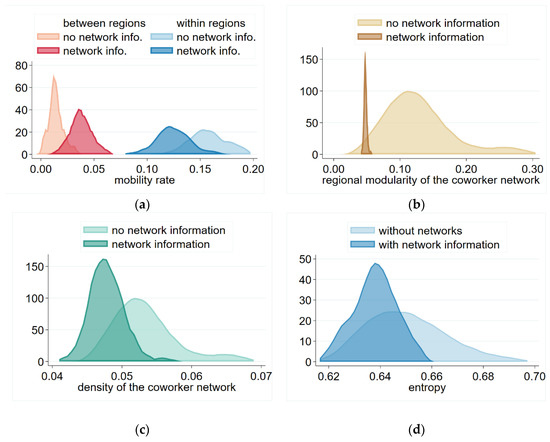Do Co-Worker Networks Increase or Decrease Productivity Differences?
by László Lőrincz
Received: 23 September 2021 / Revised: 19 October 2021 / Accepted: 26 October 2021 / Published: 31 October 2021
(This article belongs to the Special Issue Structures and Dynamics of Economic Complex Networks)
Abstract
Do labor mobility and co-worker networks contribute to convergence or divergence between regions? Based on the previous literature, labor mobility contributes to knowledge transfer between firms. Therefore, mobility may contribute to decreasing productivity differences, while limited mobility sustains higher differences. The effect of co-worker networks, however, can be two-fold in this process; they transmit information about potential jobs, which may enhance the mobility of workers—even between regions—and this enhanced mobility may contribute to levelling of differences. However, if mobility between regions involves movement costs, co-worker networks may concentrate locally—possibly contributing to the persistence of regional differences. In this paper, we build an agent-based model of labor mobility across firms and regions with knowledge spillovers that reflects key empirical  observations on labor markets. We analyze the impact of network information provided about potential employers in this model and find that it contributes to increasing inter-regional mobility, and subsequently, to decreasing regional differences. We also find that both the density of coworker networks, as well as their regional concentrations, decrease if network information is available. View Full-Text
observations on labor markets. We analyze the impact of network information provided about potential employers in this model and find that it contributes to increasing inter-regional mobility, and subsequently, to decreasing regional differences. We also find that both the density of coworker networks, as well as their regional concentrations, decrease if network information is available. View Full-Text
 observations on labor markets. We analyze the impact of network information provided about potential employers in this model and find that it contributes to increasing inter-regional mobility, and subsequently, to decreasing regional differences. We also find that both the density of coworker networks, as well as their regional concentrations, decrease if network information is available. View Full-Text
observations on labor markets. We analyze the impact of network information provided about potential employers in this model and find that it contributes to increasing inter-regional mobility, and subsequently, to decreasing regional differences. We also find that both the density of coworker networks, as well as their regional concentrations, decrease if network information is available. View Full-TextKeywords: labor mobility; co-worker networks; regional inequality; knowledge spillovers; agent-based simulation



